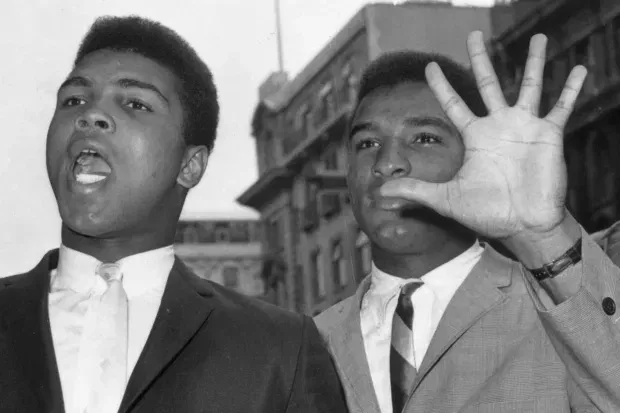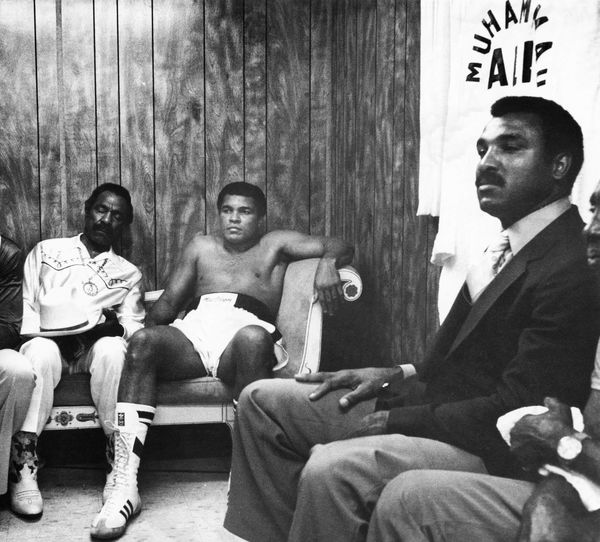

“He’s the most famous man on the planet, and I’m his brother.” That’s what Rahman Ali, the brother of Muhammad Ali, told The Sun in June 2021. And for much of the boxing world, it was true. While Muhammad Ali became an icon, a global symbol of greatness and resistance, Rahman remained by his side, in the shadows, always supporting but rarely in the spotlight. Now, 3,347 days after the world bid farewell to ‘The Greatest’ in 2016, Rahman Ali has also taken his final bow, leaving the blue dot behind.
Watch What’s Trending Now!
Earlier today, the Muhammad Ali Center announced the passing of Muhammad Ali’s younger brother, Rahman Ali, who died on August 1st at the age of 82. While the exact details surrounding his death have not been made public, the news was confirmed by Muhammad Ali’s daughter, Rashida Ali, through a heartfelt message on social media. Her tribute was accompanied by a series of touching photos that captured the love and bond shared between them over the years.
“May Allah ease our heart and grant Uncle Rahman the highest place in Jannah,” she wrote. “Indeed, to Allah we belong, and to Him we shall return. Uncle Rock was a source of love, laughter, and light, and his kindness touched all who knew him. RIP Uncle Rock❤️.” Born Rudolph Arnett Clay on July 18, 1943, in Louisville, Kentucky, Rahman Ali was 18 months younger than his legendary heavyweight brother. They grew up in a close-knit family with parents Cassius Sr., a painter, and Odessa, a domestic worker.
ADVERTISEMENT
View this post on Instagram
Their journey began after Muhammad Ali’s bike was stolen when he was 12 years old, leading them both to the local boxing gym. Rahman, then 10, joined his brother in amateur boxing, training together in Louisville’s amateur league. While Ali rose to fame after winning a gold medal at the 1960 Olympics, Rahman wasn’t selected and remained an amateur until 1964. In fact, Rahman turned professional on February 25, 1964, the same night when Muhammad won his first heavyweight title against Sonny Liston.
Much like his brother, Rahman was a heavyweight boxer, amassing a record of 14 wins, 3 losses, and 1 draw. He remained undefeated for six years and then retired from the sport after suffering back-to-back losses to Roy Dean Wallace and Jack O’Halloran in 1972. Even though Rahman was talented, he was considered a journeyman, overshadowed by the overwhelming talent, popularity, and charisma of his brother. Rather than being jealous, Rahman embraced his role by his brother’s side, dedicating much of his life to supporting his older brother’s career, serving as his chief sparring partner, confidante, and even bodyguard.
ADVERTISEMENT
Both brothers converted to Islam in the early 1960s, adopting the names by which they are known today. They stuck with each other during the turbulent civil rights era, advocating for racial equality alongside figures like Malcolm X and Elijah Muhammad. After all, their bond was forged stronger through shared experiences of racial injustice, boxing, and faith. During Muhammad Ali’s every iconic moment through time, Rahman was in his corner—from his stand against the Vietnam War draft to the ‘Rumble in the Jungle’.
Come 2014, Rahman published ‘That’s Muhammad Ali’s Brother! My Life on the undercard.’ The book, co-authored with H. Ron Brashear, is a collection of personal stories of their upbringing and Muhammad’s life. In 2019, he released ‘My Brother, Muhammad Ali: The Definitive Biography,’ co-authored with Fiaz Rafiq, offering an intimate perspective on his brother’s public and private life. Rahman, who also suffered from Parkinson’s disease, remained in Louisville, devoted to preserving Muhammad’s legacy through the Muhammad Ali Childhood Home Museum. Every time he looked back, Rahman never had any regrets.
ADVERTISEMENT
Rahman Ali recollects cutting his career to support Muhammad Ali
As Ali was rising, his brother had to make a difficult decision about his own career. Having retired from the sport in 1972, he claims to have left behind a promising career. “I was a very good boxer myself, but I helped my brother, so I cut my career to help my brother and had one of hell of a time,” he told The Sun. “My boxing career was very good.” He remembers their sparring sessions throughout their journey together.

USA Today via Reuters
BOXING: USA TODAY Sports-Archive Oct 2, 1980 Las Vegas, NV USA: FILE PHOTO Cassius Clay aka Muhammad Ali waits in his dressing room with his father Cassius Marcellus Clay Sr. left and brother Rahman Ali right before his fight against Larry Holmes at Caesars Palace. Las Vegas Nevada UNITED STATES, EDITORIAL USE ONLY PUBLICATIONxINxGERxSUIxAUTxONLY Copyright: xThexCourier-Journalx 8686290
“To spar with Muhammad Ali, he kept me sharp, and he made me a better person,” he said. “Speed and power—speed was the fastest and power was hardest.” Over time, Rahman witnessed it all, global stardom and even unwavering kindness. “He turned down nobody when it came to autographs,” he said. “He was a big sweetheart. Alongside my wife, Muhammad Ali was my best friend.”
ADVERTISEMENT
In the end, Rahman may have lived in the shadow of his legendary brother, but Muhammad Ali’s story is incomplete without him. Though often overlooked, Rahman remained proud of his brother, his family, and his quiet role in boxing history. “He’ll always be with me — in my heart, in my bones, in my mind,” Rahman Ali said to ABC News in 2016. “I miss him but I will see him again in heaven.” Indeed, he will. Do you have any words of farewell for Rahman Ali?
Top Stories
“Rest in Peace”: Condolences Pour In as Legendary Coach Freddie Roach Mourns Personal Loss

Floyd Mayweather Roasted After Video of Anthony Joshua Aura Puncturing Him Resurfaces: “50–0 to 50–3”

Fact Check: Is Anthony Joshua Being Flown to the UK by Private Jet for Car Crash Treatment?

“Stop”: Jarrell Miller Makes Emotional Plea After Family Car Crash as Anthony Joshua Story Hits Home

“RIP”: Mike Tyson’s Son, Jake Paul, and Others Send Prayers as Anthony Joshua-Linked Car Crash Kills Two

ADVERTISEMENT
ADVERTISEMENT
ADVERTISEMENT

